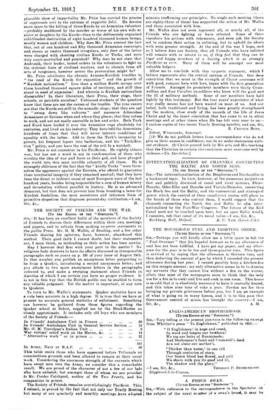THE SOCIETY OF FRIENDS AND THE WAR.
[To THE EDITOR Or THE " EISICTIT011."1 STR,—It has been an excellent habit of the members of the Society of Friends to discuss their differences within their own meetings and papers, and to refrain from making es-parte statements in the public Press. Mr. H. M. Wallis, of Reading, and a few other Friends sharing his opinions, have, however, abandoned this method. Their good faith I cannot doubt, but their statements are, I must think, as misleading as their action has been unwise.
May I however deal first with your part in the matter ? No religious body deserves to have its affairs discussed in irresponsible paragraphs such as yours on p. 195 of your issue of August 24th. In that number you publish an anonymous letter purporting to ha from a Quaker, introducing a second anonymous letter; and you allude to two more anonymous letters in the paragraphs referred to, and make a sweeping statement about Friends in America of which I am certain you have no proper evidence. 11 is not in this way that the British public min be enabled to form any reliable judgment. Yet the matter is important, at any rate to Quakers.
To turn to Mr. Wallis' s statements. Quaker statistics have as a rule been accurate in a high degree. It is true that we have at present no accurate general statistics of enlistment. Something can however be gathered from these figures regarding the Quaker school at Sidcot, supplied me by the Head-Master as closely approximate. It includes only old boys who are members of the Society of Friends :—
In Friends' Ambulance Unit in France 60 in Friends' Ambulance Unit in General Service Section ... 12
Mr. G. M. Trevelyan's Italian Unit ... ...
3 War victims' relief work on the Marne, &c. ... 14 "Alternative work" or in prison ...
111 In Army, Navy or R.A.F. ... 56
This table omits those who have appeared before Tribunals on conscientious grounds and been allowed to remain at their usual work. Considering the enormous strength of the currents which have swept men into the Army, we consider this a remarkable result. We are proud of the character of not a few of our lads 'Who have enlisted; but amongst those of whom we are proudest Is Mr. Corder Catchpool, author of On Two Fronts, and his companions in prison.
The Society of Friends remains overwhelmingly Pacificist. This, I submit, is proved by the fact that not only our Yearly Meeting but many of our quarterly and monthly meetings kave adopted
minutes reaffirming our principles. No single such meeting (there are eighty-three of them) has supported the action of Mr. Wallis and those associated with him.
Mr. Wallis does not even represent all, or nearly all, of (lie Friends who are fighting or have attested. Some of these repudiate his actions with vehemence, and even ask the Society not to condone their action in enlisting, but to uphold its ideals with even greater strength. At the end of the war I hope, and so I believe does our Society, that all Friends who have enlisted will remain with or return to us, if they feel that they can be loyal and happy members of a Society which is as strongly Pacifieist as ever. Many of them will be amongst our most valuable helpers.
Allow me to conclude with this es-parts statement, which I believe represents also the central opinion of Friends. Our deep conviction that we must in the strength of Christ overcome evil with good, conquer hate with love, began with the first generation of Friends. Amongst its prominent members were thirty Crom- wellian and four Cavalier ex-soldiers who knew well the good and the ill of military methods. Some of our members have held lightly by this testimony. But the four years' experience of what war really means has not been wasted on most of us. And our belief, both traditional and living, has been greatly strengthened by the modern, close study of the records of the life of Jesus Christ and by the inner conviction that has come to us in silent meetings and at other times when He has felt very near to us.— I enclose copies of two recent Yearly Meeting epistles, and am, Sir,
R. CHRISTIE BURN.
Sidcot, Winscombe, Somerset.
[(1) We do not publish letters from correspondents who do not give us their names in confidence; nor do we make statements with- out evidence. (2) Christ proved both by His acts and His teaching that the Christian in certain circumstances must overcome evil by violence.—ED. Spectator.]


































 Previous page
Previous page